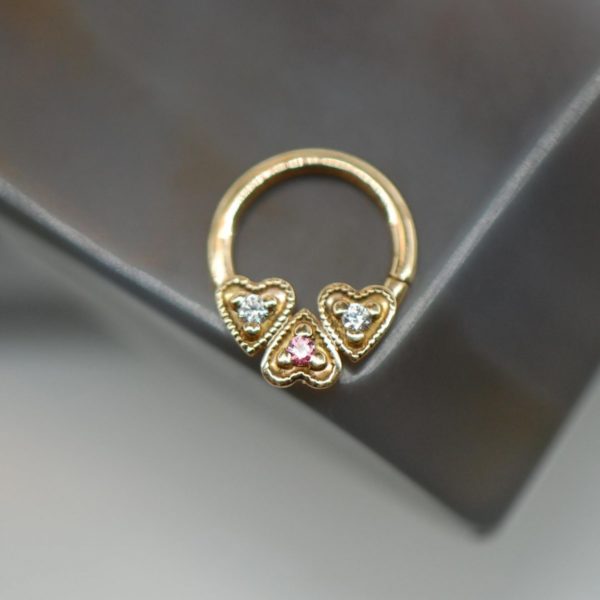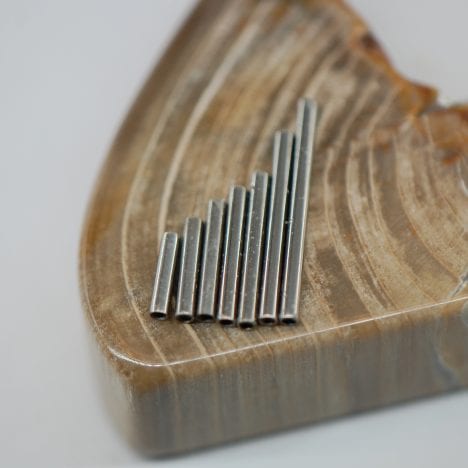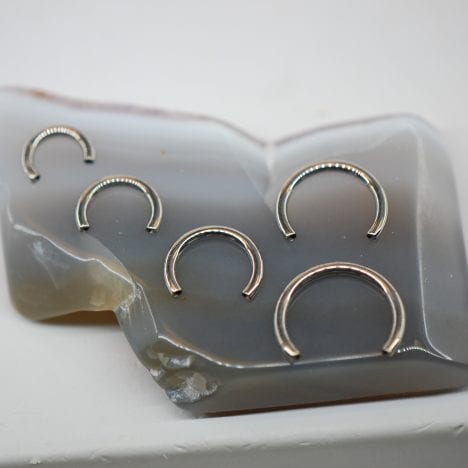So you want a horizontal tongue piercing? For those that don’t know, horizontal tongue piercings are piercings that pass through the tip of the tongue, sometimes called scoop or snake eye piercings. They look kinda cute right? Tiny, petite little beads on the tip of your tongue, something new and unique. Unfortunately, the side effects of this piercing are less then cute, which is why we don’t offer them here. Horizontal tongue piercings can cause such issues as gum erosion, chipped teeth, and lisps when talking. There’s a reason we haven’t been doing them before now, and that’s because they aren’t safe. When the mouth is closed and the tongue is at rest, the tip sits directly against the back of your front two teeth (go ahead, try it). When you put hard jewelry there, that pressed directly into the gums. Over time, that can wear them away. And once your gums are gone, they don’t come back. Also, when talking, certain letters and sounds require running your tongue over your teeth (TH-, L- S- sounds in particular). With a piercing at the tip, that means smacking your teeth with metal as you talk- a good way to end up with a chipped tooth, or snagging and tearing your piercing. Beyond that, the tongue is actually two separate muscles, connected by tissue. When these piercings are done they can often end up binding those two muscles together, and preventing them from working independently. This can lead to a lisp when speaking, and issues chewing and swallowing food.
The good news is a set of vertical tongue piercings on either side of the tongue can give a similar look, safely. As opposed to going horizontal across the tongue, these are two separate piercings that go vertically through either side. This way they don’t touch your teeth or gums, don’t rub or catch while you eat or talk, and because they are pierced with a straight barbell, you have many more jewelry choices then the curved barbell used for a horizontal.
Don’t other oral piercings carry the same risk?
No, they don’t! A traditional tongue piercing or pair of them is pierced so they don’t contact or rub the gums and teeth. Labret, Monroe, and Philtrum piercings (piercings through the lip) are pierced with the clients gum and tooth anatomy in mind. Once healed a small disc is worn that, when the piercing is placed correctly, won’t rub, catch or snag. Cheek piercings, once healed, are downsized into smaller barbells that prevent rubbing or catching. None of the traditional oral placements, carry the same level of risk as the horizontal tongue piercing (although they do carry some risk, which is why a good piercer and good dental hygiene is important!)

What if I just take it out when it starts to cause issues?
The scary thing with this piercing, as with many dental health issues, is it sneaks up on you. It’s very hard for an individual to check their own back gum lines for issues, and even harder to know exactly what you are looking for. Often you only realize it’s an issue once it’s too late. We have had a few clients go in for yearly dental exams and come out needing expensive work done, after finding out these piercings had been causing problems all along, and they never realized. This photo shows gum erosion caused by a horizontal tongue piercing (Credit: Henderson Cosmetic Dentistry)
If they are so bad, why do some people still offer them?
Unfortunately, piercing is not a very regulated industry, meaning there are no rules against doing certain unsafe or risky piercings. And as there are no formal schools or enforced standards, there’s limited distribution of information about these things. Many folks simply don’t understand the risks, and unfortunately some simply don’t care. We have decided not to offer them after seeing too many clients return with severe issues, and communicating with other piercers across the country who were seeing similar things. Here at Amato we only like to do piercings with a 100% success rate.


Here is some great further reading from the Australian Medical Associoation, who have found this piercing very dangerous and actually issued a responce to it, warning people not to get this piercing! “The muscle of the tongue is a very complex piece of apparatus, and while there haven’t been many studies done on the long term effects of these piercings, we do know that they can increase gum disease and recession.” Dr Bartone, who has been in the medical field for more than 25 years, said other complications can include infections, speech impediments, increased drooling and broken teeth.”
Update 2/28- Recently, the state of Oregon updated some of its body piercing and body art legislation. Oregon is well known for having some wonderful, progressive laws about body art designed to protect both clients and artists. Part of the new law actually bans horizontal tongue piercings. The state has acknowledged the inherent and unavoidable risks behind this piercing, and has thankfully taken action to ban it. No body piercing is worth your health, your teeth, and your speech, and hopefully other states will follow suit at banning these dangerous piercings.





